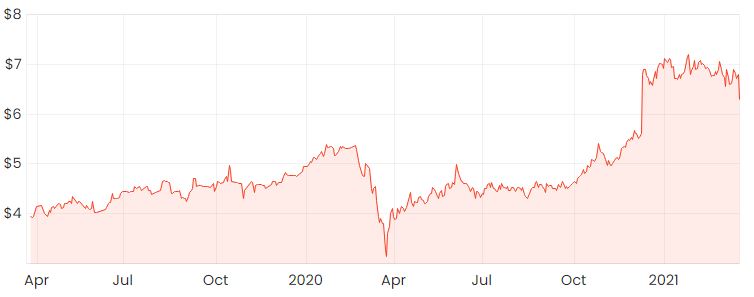The last 12 months have been challenging for Origin Energy Ltd (ASX: ORG) and other competitors in the space. At $4.63 per share, this isn’t too far off where they were this time last year.
The share price is definitely looking beat up at these levels, is there a potential investment case here?
ORG share price

What’s gone wrong for Origin?
Like many other businesses, COVID-19 has been a major contributor to its underperformance recently. COVID has significantly lowered the demand for energy, which has driven wholesale prices down.
Other energy companies that have struggled include AGL Energy Limited (ASX: AGL), Woodside Petroleum Limited (ASX: WPL), and Oil Search Ltd (ASX: OSH).
Origin has had to support customers who have been financially impacted by COVID-19 and it hasn’t been able to recover higher network costs due to regulated tariffs.
Notwithstanding COVID-19 headwinds, management revealed a milder summer season also attributed to a weaker than normal demand and higher gas supply costs.
If these challenges weren’t enough, Origin additionally faces a structural headwind of increased use of cheaper renewable sources, further driving down wholesale prices from coal-fired plants.
Many of Australia’s coal-fired stations are in loss-making territory, but Origin’s Eraring coal-fired power station is said to be more flexible and can still operate at 30% capacity.
To read more about Origin’s H1 FY21 results, click here.
Future outlook
While management has indicated that operating conditions remain challenging, it was also stated the recent strength in the oil and gas markets will have a positive impact on Origin’s liquified natural gas (LNG) business segment.
It seems fairly logical that as the world continues to push through a vaccine-led recovery, oil and gas markets may continue to recover and demand will likely rise, providing some additional upside.
While I can slightly see the appeal in a potential short-term play, the aforementioned challenges Origin faces really highlights how challenging this industry is. I can appreciate what it’s trying to achieve regarding zero and low-carbon fuels, but the structural shift into renewables seems like it may be ongoing rather than a transitory headwind.
Over the last several years, Origin’s profit and return on equity have both been declining, which is the opposite of what I’d typically look for in an attractive investment.
https://education.rask.com.au/2020/01/08/what-is-return-on-equity-roe/
Other ideas
If I was looking for share ideas in the clean energy space, I’d much prefer a company like Infratil Limited (ASX: IFT). It’s a New Zealand-based infrastructure company with investments in renewables, data centres and social infrastructure.
IFT share price

It was recently announced that it will sell its stake in Tilt Renewables (ASX: TLT), but it will still have various other energy investments involved in hydro-electric, solar and wind-powered.
Infratil can almost be thought of as a publicly-listed private equity company. It has a track record of buying assets and investing in them to sell at a much more attractive price.
One of its more recent acquisitions was a 60% stake in a Qscan Group, which is a comprehensive diagnostic imaging practice, from Quadrant Private Equity for a total cash equity consideration of up to $330 million.
Qscan owns over 300 machines that provide diagnostic imaging services predominately across the eastern seaboard of Australia. Over 85% of this industry’s revenue is funded by Medicare, so it appears to be a very reliable and defensive play.
If you’d like to read more about Infratil, click here to read: Why I think Infratil (ASX: IFT) is one ASX share to look out for.
Before you consider Origin, I suggest getting a free Rask account and accessing out full stock reports. Click this link to join for free and access our analyst reports.










